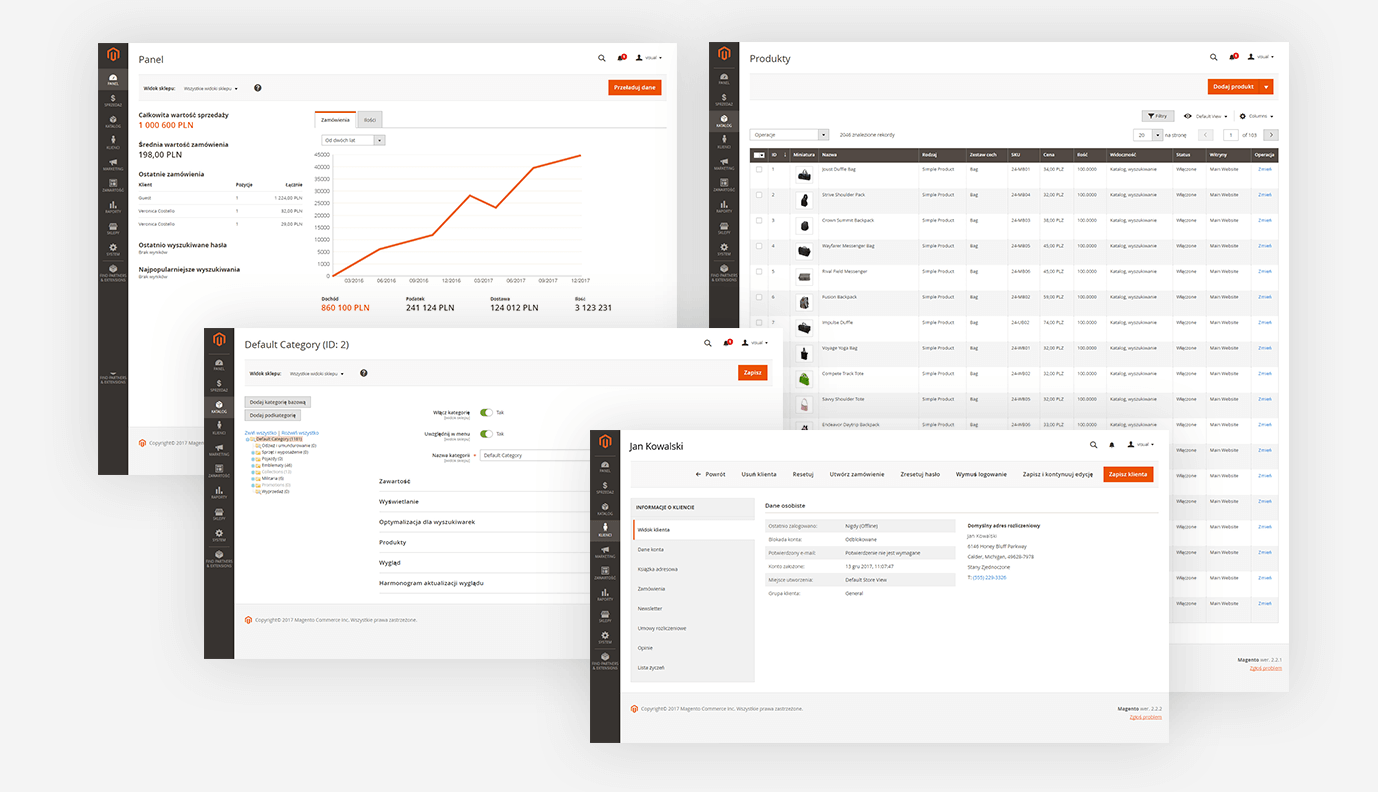E-Commerce
![]()
![]()
![]()
We create e-commerce systems supporting sales processes within B2B and B2C channels.
Depending on the project goals, we can implement an online store using the Magento or Prestashop platform, or custom solutions based on a three-tier architecture:
front-end (PWA / Vue.js) ↔ API ↔ back-end (PHP / Symfony)
Our achievements encompass projects implemented for the largest FMCG sector companies (Makro Cash and Carry Polska, Odido). We have also created platforms for such clients as UNICEF, METRO Group, Caldena, Flashstore, Fundacja Ronalda McDonalda and Deutsche Bank.
We comprehensively create e-commerce systems:
- business consulting
- usability and presentation layer designs
- platform safety and efficiency audits
- omnichannel (based on Magento platform)
- functional development of modules
- implementation and integration with systems such as data warehouses, CRM, ERP
- hosting infrastructure design
-
storing resources on dedicated servers and VPS
(24/7 administrative support) - comprehensive SLAs (for hardware and software)
We provide solutions (e-commerce platform, ERP system, marketing automation applications, integrations) which combine sales processes in one coherent system
OmniChannel Retailing

Customers are not concerned with the sales channels they use to buy products. Their goal is to satisfy a certain need, so they perceive buying as a process adjusted to their lifestyle and temporary preferences. They expect a coherent buying experience, regardless of whether they buy products online or in a brick-and-mortar shop. This applies not only to purchases, but also to numerous customer service process levels, i.e.: returns and complaints, information on products and their availability, delivery and reception, bonuses (discount vouchers, etc.).

Magento is a leading e-commerce platform used to commission online shops all over the world. This solution is tried-and-tested both by medium-sized organisations and corporate clients who use Magento as a key element of global sales strategies.
Cost optimisation
Cost optimisation - the commissioning of a shop using ready-made solutions (platform modules) is easier and quicker in comparison with dedicated solutions (designed from scratch). This applies both to the back-end (management) and front-end (shop appearance) layers.
Independence
Magento is developed in line with Open Source rules or in the Enterprise version. It comes with comprehensive documentation for users and developers. Thanks to this, you can delegate other project teams to operate it in any period of its functioning.
Flexible resource administration
It is possible to grant individual rights to each administrator, manage numerous shops from one administrative panel, with various language versions, currencies and marketing processes (newsletters, notifications, discounts).
Product and category management
Any given number of products with the possibility to assign them to numerous categories, implement any given number of product photos and video clips, setting dispatch prices depending on weight or the product itself, various product types, inventory setting or its integration with an ERP system.
Maximised sales
There are three types of product relations in Magento: Up-sells, Related Products and Cross-sell Products. Related Products - this recommendation is based on the product currently viewed by a customer who intends to buy it. More products are presented; however, the product selected initially is presented as the first one. Cross-selling - this function enables customers to buy products they do not remember when they visit the shop. It works in a similar way to the traditional impulse buying technique. Up-sells - this method is to encourage customers to spend more money to buy a more expensive model of the same product, e.g. by highlighting its additional functions or category expressed by means of quality
Comprehensive order management
Full order history and statistics, creating one or more invoices (including corrections), the possibility to edit an order within one panel, notifications about new orders via email or an RSS channel, fully configurable payment options and delivery methods, returns, the possibility to print invoices and waybills
Delivery and payment methods
The system makes it possible to make delivery costs dependent on product weight and place of delivery as well as adjust the payment methods as required. Magento’s popularity results in the fact that the majority of online payment system providers and courier companies (including parcel pick-up stations) makes dedicated API available
Reports and statistics
The Magento system reporting module encompasses all key processes, e.g. search keywords, abandoned shopping carts, newsletters, orders, returns, discount vouchers, number of orders, viewed products (possibility to define time intervals), real-time preview of shopping carts. Magento facilitates integration with Google Analytics. Reports can be generated separately for each site (shop) if the multistore function is implemented.
Mobile version
A shop interface together with content presentation (products, descriptions) is optimised for mobile devices. Magento provides templates that can be adapted in terms of colours and implemented as RWD views.
SEO optimisation
Creating user-friendly links, creating titles and descriptions for each page, defining “alt” attributes and “h” markers.
Integration
The system can be integrated with numerous ERP type platforms, CRM, price comparison sites, social networking portals, online payment applications and courier company systems.
